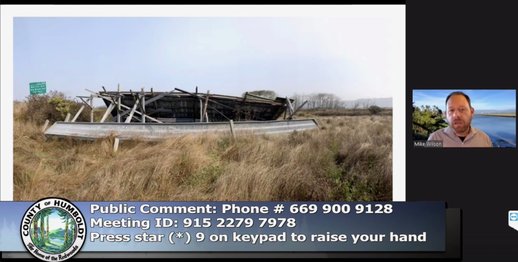News
Blue Lake Rancheria Finds Toxic Algae in the Lower Mad River
For more info on toxic algae, visit the CA Harmful Algae Blooms website.There you will see the HAB Incidents Report Map with the latest test results throughout the state, including No Swimming advisories for Big Lagoon, Stone Lagoon, and much of the Klamath River.
Fish farmers advance first permit applications
In a Split Vote, Supervisors Move to Allow Fallen Elk River Billboard to Be Rebuilt, But it Must be Removed in Five Years
 The Humboldt County Board of Supervisors on Tuesday spent another two hours debating the fate of a billboard that was felled by wind last November, ultimately voting 3-2 to allow owner AllPoints Sign Company to rebuild the structure. However, in doing so, the three-member board majority added a provision that will require the sign, which sits in wetlands along the Elk River, to be permanently removed within five years.That’s assuming it gets rebuilt. If AllPoints owner Geoff Wills accepts this five-year provision, he’ll still need to get approval from the California Coastal Commission before rebuilding the billboard.During the public comment period, three people called in to advocate for upholding the Planning Commission’s denial of the permit. Jennifer Kalt, executive director of Humboldt Baykeeper, argued that the environmental document prepared for the project was inadequate, in part because no biologist has analyzed the wetlands where the sign is situated. “In short, I’d urge you to recognize that this billboard had a good run of many, many decades,” Kalt said, adding that it’s time to get rid of this structure standing in an environmentally sensitive habitat."Tom Wheeler, executive director of the Environmental Protection Information Center (EPIC), seconded her comments and also questioned the adequacy of the environmental review. urge you to recognize that this billboard had a good run of many, many decades,” Kalt said, adding that it’s time to get rid of this structure standing in an environmentally sensitive habitat.Read More
The Humboldt County Board of Supervisors on Tuesday spent another two hours debating the fate of a billboard that was felled by wind last November, ultimately voting 3-2 to allow owner AllPoints Sign Company to rebuild the structure. However, in doing so, the three-member board majority added a provision that will require the sign, which sits in wetlands along the Elk River, to be permanently removed within five years.That’s assuming it gets rebuilt. If AllPoints owner Geoff Wills accepts this five-year provision, he’ll still need to get approval from the California Coastal Commission before rebuilding the billboard.During the public comment period, three people called in to advocate for upholding the Planning Commission’s denial of the permit. Jennifer Kalt, executive director of Humboldt Baykeeper, argued that the environmental document prepared for the project was inadequate, in part because no biologist has analyzed the wetlands where the sign is situated. “In short, I’d urge you to recognize that this billboard had a good run of many, many decades,” Kalt said, adding that it’s time to get rid of this structure standing in an environmentally sensitive habitat."Tom Wheeler, executive director of the Environmental Protection Information Center (EPIC), seconded her comments and also questioned the adequacy of the environmental review. urge you to recognize that this billboard had a good run of many, many decades,” Kalt said, adding that it’s time to get rid of this structure standing in an environmentally sensitive habitat.Read More Pacific Seafoods comes to an agreement with EPA over Clean Water Act violations
Pacific Seafoods-Eureka is set to pay a USD 74,500 (EUR 63,411) penalty as part of a settlement with the Environmental Protection Agency over Clean Water Act violations, according to an EPA press release.
A 2018 inspection by the EPA, the North Coast Regional Water Quality Control Board, and Eureka’s Public Works Department revealed that Pacific was found discharging wastewater into Eureka, California’s sewage system, and Eureka Slough in Humboldt Bay without an appropriate permit.
The EPA found that Pacific’s violations included “wastewater from the indoor shrimp processing area bypassing the facility's pretreatment system … wastewater from the de-shelling process was observed entering a storm drain; and the company was discharging the water used to rinse off oysters and crabs directly into the Eureka Slough."


